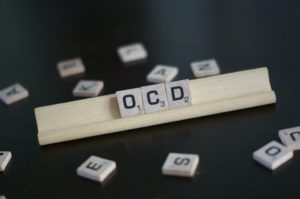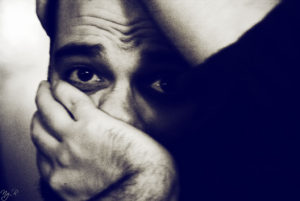Looking for an OCD definition? This article will provide a definition of OCD and some helpful information about the condition.
OCD Definition
Obsessive Compulsive Disorder, or OCD, is characterized by both obsessions and compulsions. Obsessions are recurrent urges, images, or thoughts, which are difficult to ignore. These thoughts are unwelcome and result in great distress and anxiety.
 Someone suffering from these urges, images, or thoughts will attempt to suppress, ignore, or neutralize them with a different thought or action. For example, constant, unsolicited concern about hitting someone with your car is an obsession.
Someone suffering from these urges, images, or thoughts will attempt to suppress, ignore, or neutralize them with a different thought or action. For example, constant, unsolicited concern about hitting someone with your car is an obsession.
On the other hand, compulsion is a behavior or action performed in an attempt to neutralize the obsessive thoughts. The compulsion could be a repetitive mental act or physical behavior. Some common examples of compulsions are repeatedly washing your hands, ordering things incessantly, and double checking things you already completed.
Compulsive mental acts often are things like counting, repeating words, or praying over and over again. These compulsions are used to alleviate the obsession, and if not completed can create great anxiety. The behavior helps to “calm the mind” from the obsessive thoughts and gives a sense of security from undesired outcomes.
Something very important to keep in mind is that these compulsions are not tethered to reality. For example, someone with Obsessive Compulsive Disorder may turn their light on and off three times to be sure it’s off in an attempt to prevent their house from burning down. For behavior to be considered a symptom of OCD the behavior must consume more than an hour a day and interfere with the person’s life.
If someone only has compulsions or obsessions, or if their behavior does not match the criteria above, then they probably do not have OCD, but may have another condition. In the DSM, the Diagnostic and Statistical Manual, there are differential diagnoses for each mental health condition.
A differential diagnosis is a suggestion for other diagnoses that might better fit the symptoms.
For example, OCD can be confused with other differential diagnoses, such as anxiety disorders, major depression disorder, other obsessive-compulsive related disorders, eating disorders, tics, and stereotyped movements, psychotic disorders, other compulsive-like disorders or obsessive-compulsive personality disorder.

While anxiety disorders share similar symptoms, social anxiety and specific phobias are more rooted in fear than avoidance of anxiety. If your behavior doesn’t quite fit OCD, then you could be experiencing another obsessive-compulsive disorder.
For example, you could have a body dysmorphic disorder (specific obsessions and compulsions related to your appearance), trichotillomania (a specific disorder consisting of and related to hair pulling), and hoarding disorder (a general unwillingness to discard unneeded items and distress caused by doing so). Tics sometimes appear to be symptoms of OCD because of their repetitive nature, but repeated movement is not necessarily a compulsion or related to an obsession.
Sometimes psychotic disorders can mimic the symptoms of OCD, but it’s important to know that, while OCD may cause delusional thinking and poor insight, no other psychotic symptoms will be present. Compulsive sexual activity or substance abuse is not the same as OCD as these behaviors are driven by a desire rather than by anxiety.
Another thing that can be confused with OCD is an obsessive-compulsive personality disorder. While the name is similar, it is totally different. This disorder is characterized by pervasive perfectionism and a need to be in complete control.
Signs and symptoms
Physical symptoms of OCD include agitation, impulsivity, hoarding, repetition of word/movements, social isolation, and ritualistic behavior. These Compulsions, as defined earlier, will vary from person to person, but typically remain consistent and seem necessary for the person to handle their anxiety.
If someone with OCD is interrupted or prevented from completing a compulsion, they may appear agitated. Another sign of OCD is hoarding things because they think something awful will happen if they get rid of anything. Also, repeated movements, words, or behaviors are possible compulsions.
Other than compulsions, social isolation can also indicate someone’s mental health. OCD can make people obsessively think that going outside will bring harm to yourself or someone else. Social isolation can cause depression if left untreated.
 There are also common feelings associated with OCD. Anxiety is a significant component of OCD. Anxiety occurs when they cannot complete their compulsions or drives them to their compulsions to begin with. This anxiety can disable a person if it becomes bad enough. It can get so bad that they are unable to complete normal tasks, keep a job, drive, or go outside. It can also be apart of an unhealthy cycle where the anxiety causes panic attacks, which are soothed by their compulsions.
There are also common feelings associated with OCD. Anxiety is a significant component of OCD. Anxiety occurs when they cannot complete their compulsions or drives them to their compulsions to begin with. This anxiety can disable a person if it becomes bad enough. It can get so bad that they are unable to complete normal tasks, keep a job, drive, or go outside. It can also be apart of an unhealthy cycle where the anxiety causes panic attacks, which are soothed by their compulsions.
Guilt is also associated with OCD. It’s common to hear about compulsions such as calling a family member, like a mother or father, fearing if you don’t, then some harm will come to them. Unfortunately, this can cause guilt if your family member does get sick, and you forgot to call. It is easy to think it was your fault when the two things are not connected.
Mentally, people dealing with OCD often experience repetitive thoughts that cause depression or fear, resulting in feeling out of control. It’s harder to see these internal symptoms.
While they are harder to spot, they can surface as anger or agitation. It’s key to maintain communication, remaining non-judgmental and supportive for someone with these internal struggles.
What can I do about it?
If this article is hitting close to home, then it is best to consult a doctor to get a more accurate diagnosis. Talking with a medical professional about your experience and symptoms is the first step to solving the problem. While talking to your doctor, you can ask for a referral to a psychiatrist and for information on any therapists they can recommend.
Seeing a therapist is a very helpful resource when working through the difficulty of OCD. Other options can include support groups, and personal study on anxiety, OCD, and mindfulness.
If your concern is for your children, then the most important thing is to be supportive and open to your child. If your child is wrestling with anxiety or obsessions, they may be unable to explain what they are feeling. They will likely come across as irrational and irritating, but remember there is something else going on. It can be very helpful to patiently validate their feelings, this is a way to help your child overcome their anxiety.
Another important step is to intervene early. Early intervention might mean taking your child to a psychiatrist or your primary doctor. It is also key to find a therapist trained in Cognitive Behavioral Therapy, CBT, or Exposure and Response Prevention ERP. These are the evidenced based treatments for someone with OCD.
If you are an educator and observe potential symptoms in a student, what can you do? It is best to consult your school psychologist first. Informing them will begin a process to get the child the help they need. While it is tempting to try to fix it, being a patient, open, safe person is also quite helpful. You will also want to talk to the school psychologist about how to manage their in-class symptoms in a beneficial way.
How do you treat OCD?
 When it comes to treating OCD, you have a few different types of Evidence Based Treatments (EBT). The top three are Cognitive Behavioral Therapy (CBT), Exposure and Response Prevention (ERP), and support groups for people with OCD.
When it comes to treating OCD, you have a few different types of Evidence Based Treatments (EBT). The top three are Cognitive Behavioral Therapy (CBT), Exposure and Response Prevention (ERP), and support groups for people with OCD.
Cognitive Behavioral Therapy tries to change a person’s thinking, thereby, changing their behavior and emotions. This is particularly helpful for OCD because it hits the root irrational obsessions. Rather than just target negative behavior, it helps the person create positive, healthy thoughts based in reality. By doing so, the person will be able to control and manage their emotions, allowing them to also control their behaviors and compulsions.
Exposure and Response Prevention therapy (ERP) is when a therapist exposes the person to a stimulus in order to provoke anxiety while helping them to respond in a productive and healthy manner. Over time, they are able to move away from their compulsions by learning to appropriately calm their inner anxiety.
For example, if someone believes they need to back in and out of the spot three times before turning the car off or they will kill someone the next time they drive.
ERP starts by teaching coping skills, and then moves onto small changes, liking turning the car on and off without moving it. When they are hit by the anxiety, the therapist will help remind them of their coping skills and wait until their anxiety reaches a manageable level. Finally, after practice, the person will try to pull into the spot and turn the car off, without practicing any compulsions.
The third option is support groups. These can be a great help to those dealing with OCD. In a support group, people will find a place to be known and be able to relate with people going through the same things. When someone feels supported, they are more likely to recover because they will feel more hopeful and have greater encouragement and accountability from people who understand their struggle.
Finally, medication is another option. You will need to consult a doctor to find out whether or not medicine will be right for you.
Where do I go from here?
If OCD is a problem for yourself or someone you know, reach out to medical professional or counselor. A therapist can be a powerful piece of healing from the symptoms of OCD.
Between your own efforts and the Spirit of God in you, you will be able to change and heal. Secular therapists and therapists who work in clinics accepting state insurance are available if finances are a concern. Another option is to call your insurance provider to get a list of therapists covered by your insurance. But if you are looking for a Christian Therapist, then you can pursue a Christian counseling group in your area.
“OCD”, Courtesy of Airpix, Flickr.com, CC BY 2.0 License; “Fear”, Courtesy of Noemi Galera, Unsplash.com, CC0 License; “Woman Crying”, Courtesy of Abigail Keenan, Unsplash.com, CC0 License; “Tablet Time”, Courtesy of Annie Spratt, Unsplash.com, CC0 License
-
Kate Motaung: Curator
Kate Motaung is the Senior Writer, Editor, and Content Manager for a multi-state company. She is the author of several books including Letters to Grief, 101 Prayers for Comfort in Difficult Times, and A Place to Land: A Story of Longing and Belonging...





